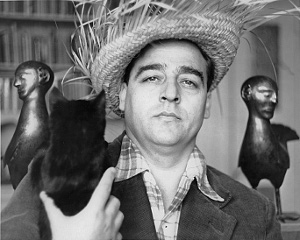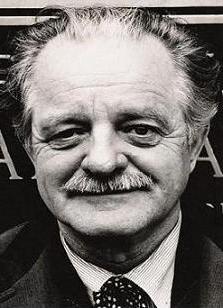Related Research Articles

Kenneth Patchen was an American poet and novelist. He experimented with different forms of writing and incorporated painting, drawing, and jazz music into his works, which have been compared with those of William Blake and Walt Whitman. Patchen's biographer wrote that he "developed in his fabulous fables, love poems, and picture poems a deep yet modern mythology that conveys a sense of compassionate wonder amidst the world's violence." Along with his friend and peer Kenneth Rexroth, he was a central influence on the San Francisco Renaissance and the Beat Generation.

Prairie City is a village in McDonough County, Illinois, United States. The population was 379 at the 2010 census.

Edgar Lee Masters was an American attorney, poet, biographer, and dramatist. He is the author of Spoon River Anthology, The New Star Chamber and Other Essays, Songs and Satires, The Great Valley, The Serpent in the Wilderness, An Obscure Tale, The Spleen, Mark Twain: A Portrait, Lincoln: The Man, and Illinois Poems. In all, Masters published twelve plays, twenty-one books of poetry, six novels and six biographies, including those of Abraham Lincoln, Mark Twain, Vachel Lindsay, and Walt Whitman.

Kenneth Charles Marion Rexroth was an American poet, translator, and critical essayist. He is regarded as a central figure in the San Francisco Renaissance, and paved the groundwork for the movement. Although he did not consider himself to be a Beat poet, and disliked the association, he was dubbed the "Father of the Beats" by Time magazine. Largely self-educated, Rexroth learned several languages and translated poems from Chinese, French, Spanish, and Japanese.

Louis Zukofsky was an American poet. He was one of the founders and the primary theorist of the Objectivist group of poets and thus an important influence on subsequent generations of poets in America and abroad.
The objectivist poets were a loose-knit group of second-generation Modernists who emerged in the 1930s. They were mainly American and were influenced by, among others, Ezra Pound and William Carlos Williams. The basic tenets of objectivist poetics as defined by Louis Zukofsky were to treat the poem as an object, and to emphasize sincerity, intelligence, and the poet's ability to look clearly at the world. While the name of the group is similar to Ayn Rand's school of philosophy, the two movements are not affiliated.
Lorine Faith Niedecker was an American poet. Niedecker's poetry is known for its spareness, its focus on the natural landscapes of Wisconsin and the Upper Midwest, its philosophical materialism, its mise-en-page experimentation, and its surrealism. She is regarded as a major figure in the history of American regional poetry, the Objectivist poetic movement, and the mid-20th-century American poetic avant-garde.
William "Bill" Everson, also known as Brother Antoninus, was an American poet of the San Francisco Renaissance and a literary critic, teacher and small press printer.
David Ignatow was an American poet and editor.

Working Classics: Poems on Industrial Life is a landmark literary anthology of American working-class poetry written during the second half of the 20th century.

The City Lights Pocket Poets Series is a series of poetry collections published by Lawrence Ferlinghetti and City Lights Books of San Francisco since August 1955.
Bernard Harden "Bern" Porter was an American artist, writer, publisher, performer, and physicist. He was a representative of the avant-garde art movements Mail Art and Found Poetry.
American Poetry Since 1950: Innovators and Outsiders is a 1993 poetry anthology edited by Eliot Weinberger. First published by Marsilio Publishers, it joined two other collections which appeared at that time: From the Other Side of the Century: A New American Poetry, 1960-1990 and Postmodern American Poetry, a 1994 poetry anthology edited by Paul Hoover. These three anthologies were perhaps seeking to be for their time what Donald Allen's anthology, The New American Poetry, was for the 1960s.
Nationality words link to articles with information on the nation's poetry or literature.
The Shelley Memorial Award of the Poetry Society of America, was established by the will of Mary P. Sears, and named after the poet Percy Bysshe Shelley. The prize is given to a living American poet selected with reference to genius and need, and is currently worth (2014) between $6,000 and $9,000. The selection is made by a jury of three poets: one each appointed by the presidents of Radcliffe and Berkeley, and the third by the Board of Governors of the Society.
Links to nations or nationalities point to articles with information on that nation's poetry or literature. For example, United Kingdom links to English poetry and Indian links to Indian poetry.
Richard Lowell Blevins is a poet writing in the tradition of Ezra Pound, H.D., and Robert Duncan, an editor of the Charles Olson-Robert Creeley correspondence, and an award-winning teacher. He was born in Wadsworth, Ohio, in 1950. His undergraduate career was halved by the May 4, 1970, Kent State shootings. He was declared a conscientious objector during the Vietnam War. At Kent State, he studied poetry and the imagination with Duncan and literature of the American West with Edward Dorn. But he has often said that Cleveland book dealer James Lowell was his most formative early influence. He holds degrees from Kent State University, the University of Oregon, and the University of Pittsburgh (Ph.D., English literature, 1985; dissertation on the western novels of Will Henry. He has taught literature and poetry writing at the University of Pittsburgh at Greensburg since 1978, also serving as Humanities Chair for nine years. He is a winner of a Chancellor’s Award, in 1999, the university’s highest recognition for teaching. He previously taught at the University of Akron and Kent State.
Circle Magazine was published from 1944 to 1948 by George Leite, initially with poet Bern Porter. Produced at Leite's Berkeley, California, bookstore daliel's, it featured poetry, prose, criticism and art from many of those whose creative works and their successors would later come to be called the San Francisco Renaissance. In addition to the magazine, Circle Editions published contemporary authors such as Albert Cossery and Henry Miller.
Tom Boggs was an American poet, editor, and novelist who emerged as a Greenwich Village Bohemian during the Jazz Age of the 1920s.
The Why? Group published several anarchist magazines in the 1940s and 1950s. Why? An Anarchist Bulletin and its successor, Resistance, ran between 1942 and 1952. Members of the group included Paul Goodman, Dwight Macdonald, Kenneth Rexroth, and Kenneth Patchen. Another magazine, Retort, ran between 1942 and 1947 and was related to the group.
References
- 1 2 3 4 5 6 7 8 Ballowe, James. "Little Press on the Prairie". Chicago Reader. Retrieved 2020-12-29.
- 1 2 3 4 "The Decker Press - Article by John Hallwas". www.connectotel.com. Retrieved 2020-10-29.
- 1 2 3 4 5 6 Hallwas, John (August 2019). "An Array of Forgotten Voices: The Decker Press". Illinois Heritage magazine. 22: 10–12.
- 1 2 Wharton, Will (1950). "Correspondence". Poetry. 77 (1): 58–58. ISSN 0032-2032.
- ↑ "Couple Found Slain in Car; Woman Blamed". Chicago Daily Tribune. 11 May 1950.
- ↑ "Archives - Decker Press Bibliography - Western Illinois University". www.wiu.edu. Retrieved 2021-02-04.
- ↑ "Archives - Decker Press Collection - Western Illinois University". www.wiu.edu. Retrieved 2020-12-29.